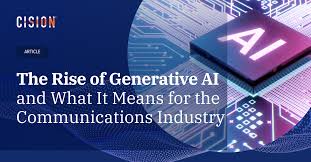In the ever-evolving landscape of technology, artificial intelligence Generative AI Blog stands as the quintessential emblem of innovation. Its transformative potential permeates various facets of our lives, reshaping industries, augmenting human capabilities, and revolutionizing how we perceive and interact with the world. As we embark on a journey into the heart of AI’s evolution, we uncover the myriad of ways this groundbreaking technology is redefining our future.
The Genesis of Artificial Intelligence: From Concept to Reality
The inception of AI dates back to the mid-20th century when pioneers like Alan Turing and John McCarthy laid the groundwork for a new era of computational intelligence. What began as a theoretical concept soon materialized into tangible advancements, fueled by exponential growth in computing power and the advent of sophisticated algorithms.
The Rise of Machine Learning and Deep Learning
Machine learning emerged as a cornerstone of AI, enabling systems to learn from data and improve performance without explicit programming. From predictive analytics to recommendation systems, machine learning algorithms permeate countless applications, driving efficiency and innovation across industries.
Deep learning, a subset of machine learning inspired by the structure and function of the human brain, has propelled AI capabilities to unprecedented heights. Neural networks with multiple layers simulate the complex interconnectedness of neurons, empowering machines to recognize patterns, understand language, and even generate creative content.
AI in the Real World: Transforming Industries
In today’s digital age, AI’s impact reverberates across diverse sectors, catalyzing disruptive change and unlocking new possibilities. In healthcare, AI-driven diagnostics accelerate disease detection and treatment, while predictive analytics optimize patient care and resource allocation.
In finance, algorithmic trading and fraud detection algorithms harness the power of AI to enhance decision-making and mitigate risks. Meanwhile, in manufacturing, smart robotics and predictive maintenance algorithms optimize production processes, driving efficiency and minimizing downtime.
Ethical Considerations and Societal Implications
Amidst AI’s transformative potential lies a myriad of ethical considerations and societal implications that demand careful scrutiny. Concerns regarding data privacy, algorithmic bias, and job displacement underscore the need for responsible AI development and governance frameworks.
As AI becomes increasingly integrated into our daily lives, ensuring transparency, fairness, and accountability remains paramount. Initiatives aimed at promoting AI ethics and fostering interdisciplinary collaboration are crucial in navigating the complex ethical terrain of AI.
The Road Ahead: Toward Human-Centric AI
Looking ahead, the trajectory of AI’s evolution is poised to intersect with the realm of human-centric design, emphasizing symbiotic collaboration between humans and machines. As AI systems become more adept at understanding human intentions and emotions, the potential for augmented intelligence—the fusion of human expertise with AI capabilities—becomes a tangible reality.
Empowering individuals with AI-enhanced tools and technologies holds the promise of unlocking human potential and fostering creativity across domains. By harnessing the synergistic capabilities of humans and machines, we can chart a course towards a future where AI serves as a catalyst for positive societal change.
Conclusion
The evolution of artificial intelligence represents a profound journey of innovation, discovery, and transformation. From its humble beginnings as a theoretical concept to its pervasive presence in our daily lives, AI continues to push the boundaries of possibility, reshaping industries, and redefining the human experience.
As we navigate the complex terrain of AI’s evolution, it is imperative to remain vigilant, mindful of the ethical considerations and societal implications that accompany technological advancement. By fostering a human-centric approach to AI development and governance, we can harness its transformative potential to create a future that is not only intelligent but also inherently humane.

